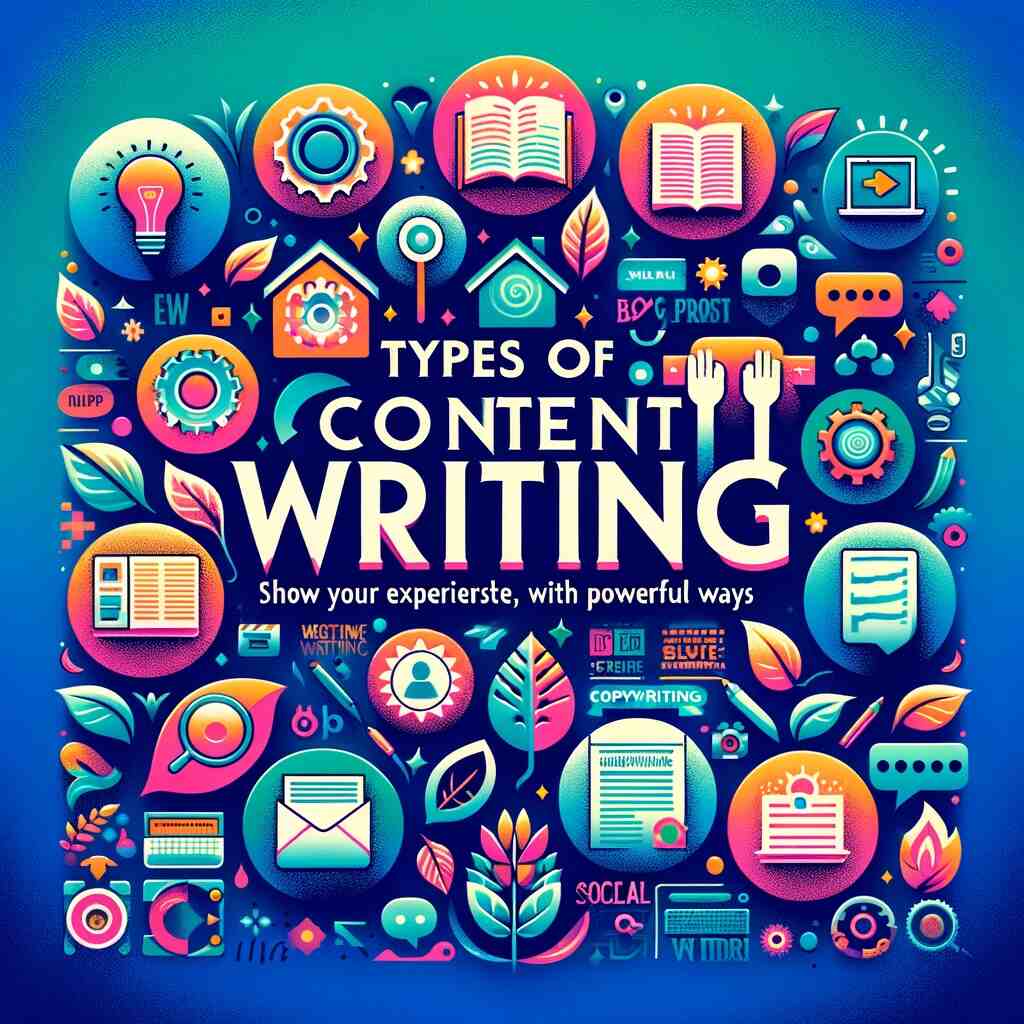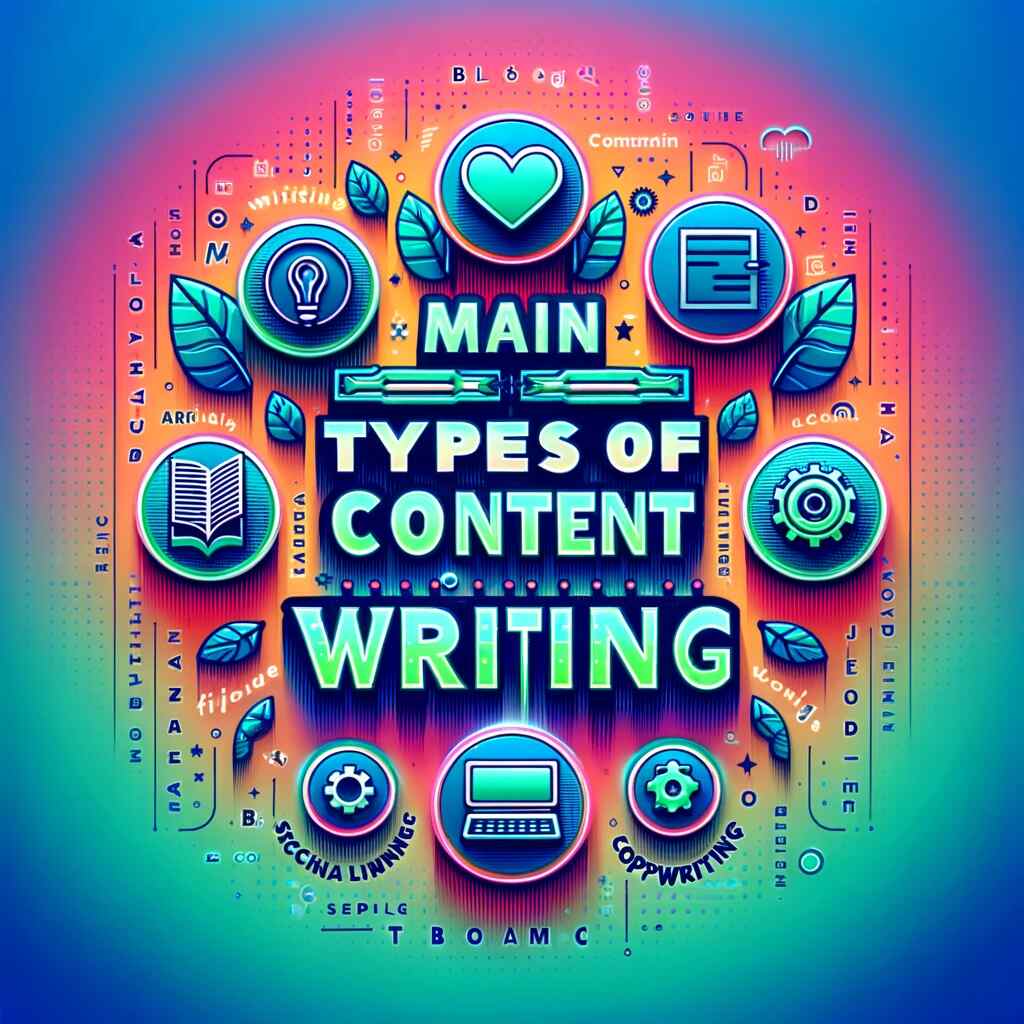Master the art of content creation! Explore the different types of content writing – informative, persuasive, and engaging – and learn how to choose the right type to reach your target audience.

Introduction
What is Content Writing?
In the digital age, content is king. But how do you create that content that reigns supreme? That’s where content writing comes in. Content writing is the art of crafting written pieces specifically designed for online audiences. It’s more than just informative; it’s about engaging readers, conveying a message, and achieving specific goals.
Think of it as a conversation you have with your audience. You provide valuable information, entertain them with a compelling story, or persuade them to take action – all through the power of the written word. Content writing encompasses a wide range of formats, from blog posts and articles to website copy and social media captions.
Importance of Content Writing in the Digital Age
In today’s online world, content is the currency of connection. Here’s why content writing is more important than ever:
- Boosts Search Engine Optimization (SEO): High-quality, informative content is essential for ranking well in search engine results. Content rich in relevant keywords helps search engines understand your website and connect it with users searching for related topics.
- Builds Brand Awareness: Engaging content establishes your brand as a thought leader in your industry. By consistently providing valuable information, you position yourself as a trusted resource and attract potential customers.
- Drives Traffic and Leads: Well-crafted content attracts visitors to your website or social media pages. By providing solutions to their problems or piquing their interest, you can convert those visitors into leads and ultimately, paying customers.
- Increases Customer Engagement: Content fosters a two-way street with your audience. Informative and engaging content keeps users coming back for more, fostering loyalty and brand advocacy.
Content writing is a powerful tool for businesses of all sizes. By effectively crafting content that resonates with your target audience, you can achieve your digital marketing goals and establish a strong online presence.

Main Types of Content Writing
Content writing can be broadly categorized into three main types, each serving a distinct purpose:
A. Informative Content Writing:
This type of content focuses on educating and informing your audience. It establishes your brand as a credible source and builds trust with potential customers.
- Blog Posts (Informative and Educational): These are versatile pieces that can cover a wide range of topics related to your industry. They provide valuable insights, answer common questions, and keep your audience engaged with fresh content.
- E-books and White Papers (In-depth Guides on a Specific Topic): Offering in-depth analysis and detailed information, these comprehensive pieces establish your expertise and position you as a thought leader. They are often used as lead magnets to capture valuable user information.
- Case Studies (Demonstrating Successful Results): Showcase the effectiveness of your product or service by highlighting real-world success stories. Case studies build trust and convince potential customers that you can deliver results.
- Articles (News, Research-based): Keep your audience updated on industry trends and developments. News articles provide fresh perspectives, while research-based pieces offer data-driven insights to solidify your credibility.
- User Manuals and Guides (Providing Instructions): Ensure users can navigate your product or service effectively with clear and concise instructions. User manuals, FAQs, and step-by-step guides provide a smooth user experience.
- How-to Guides and Tutorials (Step-by-step Instructions): Empower your audience with practical knowledge. These guides break down complex processes into easy-to-follow steps, making your brand a valuable resource.
B. Persuasive Content Writing:
This category aims to influence your audience’s behavior and drive conversions. It uses persuasive language and targeted messaging to convince readers to take a specific action.
- Website Copywriting (Landing Pages, Product Descriptions): Craft compelling website content that entices visitors to explore further, subscribe to your services, or make a purchase. Landing pages and product descriptions should be clear, concise, and highlight the value proposition.
- Advertising Copywriting (Print and Online Ads): Grab attention and generate interest with captivating ad copy. This type of writing uses strong calls to action (CTAs) to prompt a desired response.
- Sales Copywriting (Persuading Customers to Buy): Convince potential customers that your product or service is the solution to their problems. Sales copywriting leverages emotional triggers and emphasizes the benefits of your offering.
- Email Marketing (Newsletters, Promotional Emails): Nurture leads and convert them into paying customers through targeted email campaigns. Informative newsletters keep your audience engaged, while promotional emails highlight special offers and encourage sales.
C. Engaging Content Writing:
This type of content prioritizes interaction and fostering a connection with your audience. It uses creative storytelling and visuals to keep readers hooked and coming back for more.
- Social Media Posts (Short, Catchy, and Informative): Capture attention in a fast-paced environment with concise and engaging social media posts. Use visuals, humor, and current trends to spark conversations and build a loyal following.
- Blog Posts (Lighter and More Conversational Tone): While informative content writing for blogs educates, engaging content writing adopts a lighter and more conversational tone. It fosters a sense of community and encourages interaction with your audience.
- Scripts for Videos and Podcasts (Informative and Entertaining): Move beyond text and explore the power of multimedia content. Scripts for videos and podcasts provide valuable information in an entertaining format, allowing you to connect with your audience on a deeper level.
- Infographics (Visual Representation of Data): Present complex information in a visually appealing and easily digestible way. Infographics use charts, graphs, and icons to make data come alive and capture attention.

Choosing the Right Type of Content Writing
With a diverse range of content writing styles at your disposal, selecting the most effective option requires careful consideration. Here are the key factors to guide your decision:
- Target Audience: Who are you trying to reach? Understanding your audience’s demographics, interests, and pain points is crucial. Tailor your content type to resonate with their specific needs and preferences. For example, crafting technical white papers for industry professionals would differ from creating humorous social media posts for a younger audience.
- Content Purpose: What do you aim to achieve with your content? Do you want to educate readers, influence their buying decisions, or simply spark conversation?
- Informative content writing excels at educating your audience, building brand authority, and establishing trust.
- Persuasive content writing focuses on driving conversions, encouraging specific actions like subscribing to a newsletter or making a purchase.
- Engaging content writing prioritizes building relationships and fostering a community around your brand.
- Platform: Where will your content be published? The platform dictates the format and length best suited for the audience’s typical behavior.
- Websites: Landing pages and product descriptions demand clear, concise copywriting focused on conversion. Blogs allow for more flexibility, accommodating both informative and engaging writing styles.
- Social Media: Short, catchy, and visually appealing content reigns supreme on social media platforms.
- Email Marketing: Emails can leverage a mix of informative and persuasive writing to nurture leads and drive sales.
By considering these three factors – target audience, content purpose, and platform – you can choose the type of content writing that will resonate most effectively with your readers and achieve your desired outcomes.
Essential Skills for Content Writers
In the competitive world of content creation, mastering a specific writing style is just one piece of the puzzle. Here’s a breakdown of the essential skills that will equip you to thrive as a content writer:
Research and Information Gathering:
Content without substance falls flat. Being a skilled researcher allows you to gather accurate and up-to-date information to support your writing. This may involve scouring credible sources, conducting interviews with experts, and staying abreast of industry trends.
Strong Writing Skills (Grammar, Clarity, Conciseness):
The foundation of compelling content lies in clear and impactful writing. A solid grasp of grammar, punctuation, and spelling is essential. Beyond mechanics, strive for clarity by expressing complex ideas in a way that is easy for your audience to understand. Conciseness is also key – eliminate unnecessary words and ensure your message resonates without rambling.
SEO Optimization (for website content):
In today’s digital landscape, understanding SEO is crucial for website content. Optimizing your writing with relevant keywords helps search engines understand your content and rank it higher in search results. This increases organic traffic and drives potential customers to your website.
Content Strategy:
Exceptional content doesn’t appear by accident. Effective content writers possess a strategic mindset. This involves understanding your target audience’s needs, developing a content calendar, and aligning your writing with your overall marketing goals.
Understanding of Target Audience:
The ability to see through the eyes of your reader is invaluable. Developing a strong understanding of your target audience – their demographics, interests, and challenges – allows you to craft content that resonates with them on a deeper level. This not only increases engagement but also positions your brand as a trusted resource that understands their needs.
By honing these essential skills, you’ll be well-equipped to navigate the ever-evolving world of content writing. Remember, the ability to research, write clearly, optimize for search engines, develop a strategic approach, and understand your audience are the cornerstones of content writing success.

Finding Work as a Content Writer
The demand for skilled content writers is on the rise. Here are some avenues to explore as you embark on your content writing journey:
- Freelance Platforms: Several online platforms connect freelance writers with businesses seeking content creation services. Popular options include Upwork, Fiverr, and Freelancer.com. These platforms offer flexibility and allow you to build a portfolio while working on diverse projects.
- Content Marketing Agencies: Many companies outsource their content creation needs to content marketing agencies. These agencies employ content writers with various specializations. Researching agencies in your niche and showcasing a strong portfolio can open doors to exciting opportunities.
- Direct Contact with Businesses: Don’t underestimate the power of proactive outreach. Research businesses in your target industry and identify their content needs. Craft a compelling proposal highlighting your skills and experience, and directly contact their marketing teams.
Conclusion
The landscape of content writing is constantly evolving. New platforms emerge, audience preferences shift, and search engine algorithms change. To stay ahead of the curve, here are some key takeaways:
- The Ever-Evolving Landscape of Content Writing: Embrace lifelong learning. Stay updated on industry trends, explore new content formats, and familiarize yourself with the latest SEO best practices.
- Importance of Staying Updated with Trends: By continuously honing your skills and adapting to the ever-changing content landscape, you’ll position yourself as a valuable asset in the eyes of potential clients and employers.
Content writing is a rewarding career path that allows you to combine your passion for writing with the power to connect with audiences and influence their decisions. By mastering the different content writing styles, developing the essential skills, and actively seeking opportunities, you can carve your niche in this dynamic and ever-growing field.
